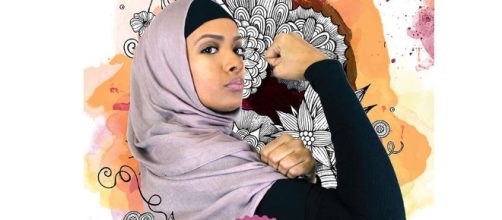Hi-jab is an Arabic word meaning ‘'cover.'' It is a head covering worn mostly by Muslim Women. The Holy Quran enlightens women to wear a loose outer covering around their heads, covering their chest (Quran 24:32). This is to establish a sense of autonomy for women who are voicing that they choose not be objectified, rather, be valued for their inner strength and character. The veil was and is a choice women make as to how they would like to be identified, which further represents the teachings of Islam, centered on modesty and humility as opposed to materialism.
The Quran also emphasizes that, ‘'There is no compulsion in religion’' (Quran 2:257), therefore it is highly ignorant for a nation to assert that veiled women are oppressed and are submitting to the will of man. This verse beautifully affirms the core teachings of the religion, to bring about peace. A woman who is wearing the veil against her will negates the true purpose of the religion, Islam, which is love, unity and peace. No individual should wear or represent something unwillingly.
What does the Hijab mean to me?
What does Hijab mean to me? It is an allegiance to God, a shield against immorality and a mark of modesty. It is a grave misconception that the veil takes away the rights of women and is a sign of tyranny.
Contrary to this, Islam was the first religion to entitle women with the right to inheritance, education, work, love and respect. ''It is not lawful for you to inherit women against their will...consort with them in kindness..''(Quran 4:20)
What something means to someone is purely subjective; hence, no one has the right to assert whether it is or is not significant. Nor do they have the right to say whether someone is being subjected to duress. Only those wearing the veil have the right to speak up against, or in my case, speak in favor of the Hijab.
Many veiled women like myself make the choice to be looked at from the inside out. We live by the sayings of Prophet Muhammad (may peace be upon him), ''Allah does not look at your appearance, but rather looks at your heart and actions.'' It's heartbreaking to see and hear accounts of women being discriminated against on that basis.
Amasa Firdaus from Nigeria is just one example of the discrimination that still exists today. Just two months ago, law graduate Amasa was denied her right to be called to the Bar, because she refused to remove her headscarf. The Nigerian Law School asserted that she was tampering with the dress code set by the university.
Innately, Amasa felt that her rights to freedom of religion as protected by section 38 of the 1999 constitution of the Federal Republic of Nigeria, were being breached. The Nigerian Bar Association have vouched to look into this matter, however, this outdated bigotry has caused quite an uproar on social media, with #justiceforfirdaus trending on Twitter.
Nazma Khan
It’s cases like these that make World Hijab Day a necessary endeavour, in order to educate and inspire.
Nazma Khan, a Bangladesh native who grew up in New York, initiated World Hijab Day as she was bullied for being a Muslim and wearing a Hijab, particularly after the 9/11 attacks. World Hijab Day is held annually on February 1st. Nazma’s non-profit organization invites women from diverse backgrounds to wear a hijab for one day alongside Muslim peers, in sheer solidarity.
She states: "perhaps, this one day experience will make them see the Hijab in a different light'. This creative movement is widely celebrated all over the world and it is humbling to witness for Muslim women like myself. Every day, Muslim women wearing the Hijab in America live inside the world of a western society. It's a revolutionary concept for women in the west to live inside the world of Muslim women for one day.
A short message of gratitude from the founder of #WorldHijabDay. #StrongInHijab pic.twitter.com/rskryWJnLf
— World HijabDay (@WorldHijabDay) February 1, 2018
https://t.co/Y1ZM4wqtOS#justiceforfirdaus
— Justiceforfirdaus (@Justice4firdaos) February 1, 2018


